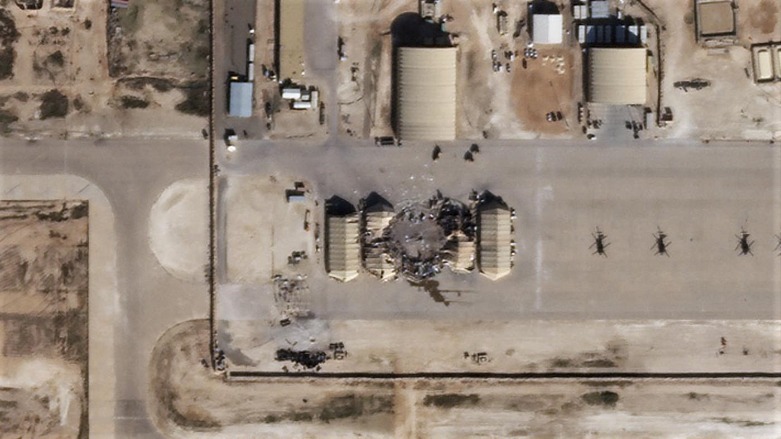US waiting for results of investigation into yet another rocket attack in Iraq

WASHINGTON DC (Kurdistan 24) – US officials, from President Joe Biden on down, responded to Wednesday’s rocket attack on Al-Asad Airbase in Iraq’s western Anbar Province by saying that they would wait for the results of the Iraqi government’s investigation, before deciding on any action that they might take.
As in the aftermath of the three previous rocket attacks, starting with the Feb. 15 assault on Erbil International Airport, US officials declined to even speculate on which party might have been responsible.
Responding to a journalist’s question about the attack, before a meeting with Congressmen to discuss developing cures for cancer, Biden stated, “We’re identifying who is responsible, and we’ll make judgments from that point.”
At State Department and Pentagon briefings later that day journalists asked sharp questions about the administration’s policy on Iran.
In response, State Department Spokesperson Ned Price came very close to saying what many analysts suspect: the administration’s muted response is due to its desire to restart talks on Iran’s nuclear program and restore the 2015 agreement, formally known as the Joint Comprehensive Plan of Action (JCPOA), which Donald Trump abrogated in 2018.
“Our overarching objective is to impose verifiable and permanent limits on Iran’s nuclear program,” Price said. “That is what we are seeking here.”
Notably, “permanent limits” suggests the administration is seeking to address at least one significant shortcoming in the JCPOA, which had various sunset clauses. Key provisions simply ended, raising the prospect that Iran could develop a nuclear weapon sometime in this decade.
Indeed, five senior Republican senators released a letter to Biden earlier this week, criticizing the JCPOA. The sunset clauses were among their principal objections.
The Attack Itself
Also on Wednesday, Pentagon Press Secretary, John Kirby, provided more details about the attack on Al-Asad Airbase. There were ten points of impact, he stated, but a rocket defense system (C-RAMS—Counter Rocket, Artillery, and Mortar System) was activated and operational, raising the possibility that more than ten rockets had been fired at the base.
The rockets were launched from multiple points and they came from the east, he also said.
Journalists’ Criticisms
The Washington DC press corps is, generally, not very bellicose. Yet journalists were unusually critical of the administration’s approach to Iran and its allies, including the Houthis in Yemen.
The strongest critique was articulated by a reporter covering the State Department. He suggested that the US outreach to Iran was proving counter-productive. Iran was increasing its belligerence, rather than reciprocating the US overtures.
The Biden administration is seeking to negotiate an end to the devastating civil war in Yemen. So it has removed the Houthis from the US list of terrorist organizations. The Houthis control some 80% of Yemen and that designation, imposed in the last days of the Trump administration, was making it difficult for international relief agencies to get humanitarian aid into the country.
The Biden administration also removed two Houthi leaders from the US terrorism list, although it did keep them on a sanctions list regarding Yemen.
Citing those two points, the reporter noted that the Houthis had, in response, “stepped up their offensive in Marib,” an oil-rich region and the last territory still under the control of the internationally-recognized government.
They have also “increased the number of rocket attacks going into Saudi Arabia,” he continued, and “on top of that, they also rejected your offer to get back into the [nuclear] talks and stepped up their violations of the JCPOA.”
Indeed, the reporter could have added two other recent acts of Iranian aggression. One was the sabotage of an Israeli-owned cargo ship in the Gulf of Oman last Friday. The second was a plot to bomb the embassies of the United Arab Emirates (UAE) in Ethiopia and Sudan, but which was thwarted by authorities in both countries, as The New York Times reported late last month.
Read More: Biden administration continues pursuit of nuclear deal with Iran amid new bomb plot allegations
It was in response to the reporter’s list of Iranian transgressions that Price finally responded that the administration’s “overarching objective” was a new nuclear agreement.
Thus, everything else, it seems, is subordinated to that goal—despite negligible progress and the increased belligerence of Iran and its allies.
Moreover, Nicholas Heras, a Senior Analyst at the Newsline Institute, cautioned that, with regard to the rocket attacks, Washington might be putting too great a burden on the Iraqi government, which, itself, is very vulnerable to Iranian pressure.
“The Iran-backed militias are in an escalation pattern with the United States,” Heras told Kurdistan 24, “betting that Biden will not strike them in Iraq and [Iraqi Prime Minister Mustafa] al-Kadhimi cannot bring them to justice.”
“The US might need to take the burden off of Kadhimi's shoulders,” he advised, “and be more proactive in taking the fight to Iranian-backed militias in Iraq.”
Editing by John J. Catherine
